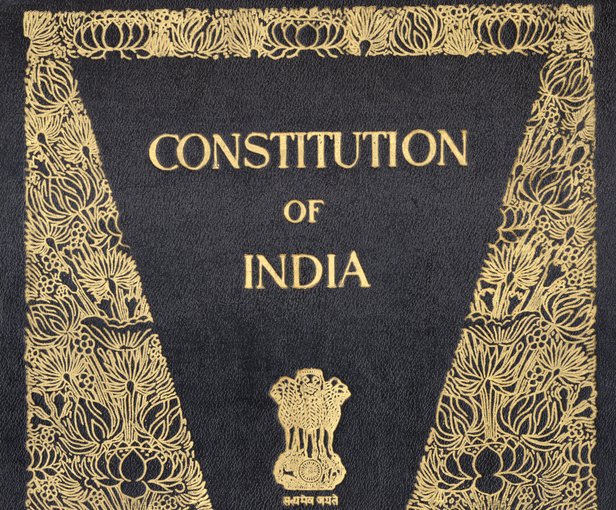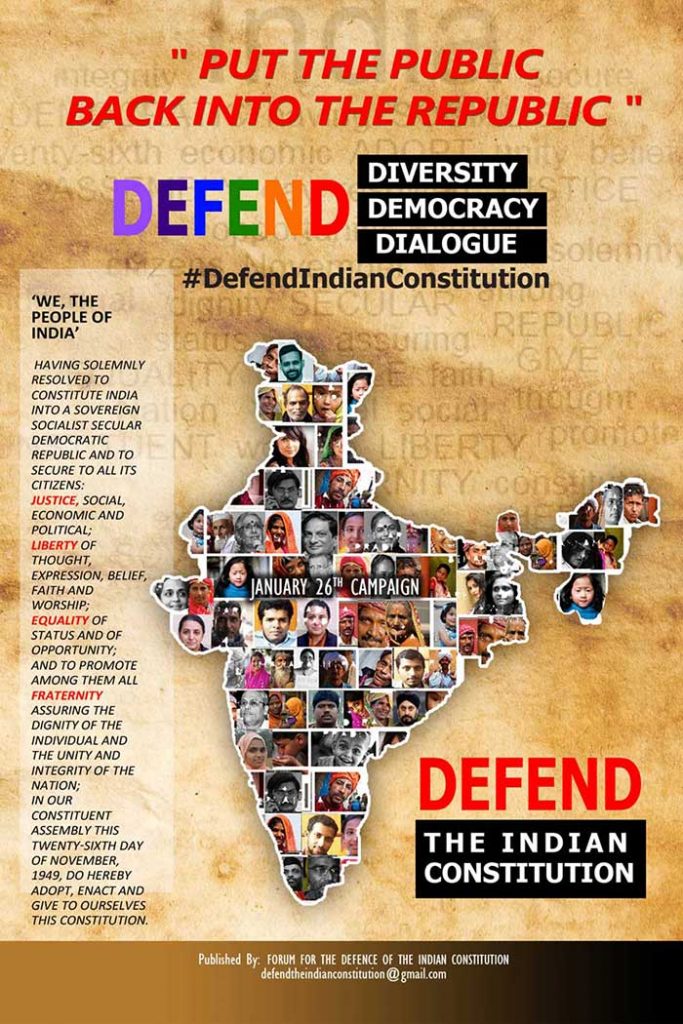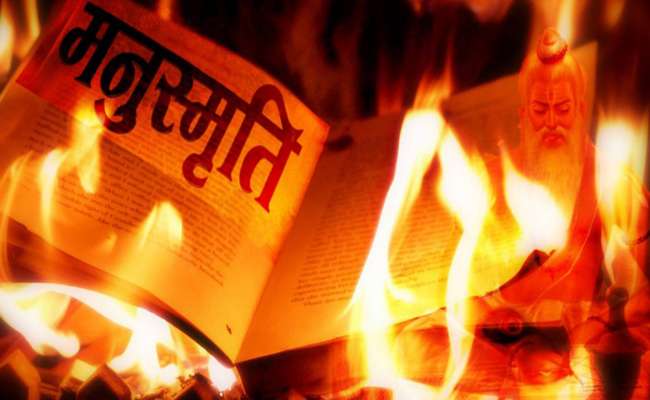
Our present BJP-RSS rulers are trying overtime to change the Constitution of India in the interest of themselves and their party. They are trying to convince people that if Nehru can amend the Constitution within the first fifteen months of its adoption in the interest of his party, then why can’t they?
Well, the constitution is not Shalgramshila (a solid rock which cannot be worked). With the times, it can be amended in line with the needs of the masses. In fact, Indian constitution has later been amended more than a hundred times.
The question is – in whose interest, with what purpose to amend the constitution? Whose interest did Nehru seek to serve? Whose interests do the present rulers want to serve? Nehru wished India to be a modern secular state. Parliamentary democracy will be the form of government. In order to build a capitalist or ‘socialist pattern’ state, feudalism has to be done away with. For that, Zamindari system has to be abolished and land reform has to be implemented. The Congress made such demands during the freedom struggle and promised to implement them if in power.
On the contrary, the present rulers want India to be a Hindu state, not a secular one. Religious minorities can stay in India as second class citizens. Otherwise, they can go to Pakistan or anywhere else. For good governance, they seek to replace the present parliamentary system with a presidential system of government. They are out to use their majority in Parliament to turn the constitutional institutions into tools for their own self-interest.
So they are trying to make Jawaharlal Nehru, the first Prime Minister of India, a villain. They complain that Nehru’s first amendment to the Constitution curtailed people’s fundamental rights enshrined in it. And he did so ignoring the warnings of many other constitution makers and political leaders.
Researcher Tripurdaman Singh writes in his book ‘Sixteen Stormy Days’ that at that time “High Court and Supreme Court judges, liberal parliamentarians like Hridaynath Kunjru and HV Kamath, Hindu nationalists like KR Malkani and Shyamaprasad Mukherjee, Gandhians like Kripalni, as well as disparate figures from all sides of the political spectrum—editors, writers, businessmen alike—advocated and doggedly defended this (new republican vision) in the face of a determined onslaught by the government. It is to this vision that the first amendment dealt a crippling blow.” (P. 205) He further writes that Shyamaprasad “had warned Nehru to stick with the original Constitution, that he was creating legal tools that would one day be wielded by his opponents, that his rule or that of his ideological co-travelers would not be eternal.” (P. 206)
Bhim Rao Ambedkar, chairman of the constitution writing committee, told the Constituent Assembly on November 25, 1949, “I think a good constitution would be ruined if it fell into the hands of bad people. No matter how bad a constitution may be, it would be better to have it under the supervision of some good people.” He added, “I do not know whether Indians will see their own interests as greater than the country’s, or will see the country as greater than their personal interests. But it is certain that if political parties put the interests of the party before the interests of the country, our independence will be ruined again and will probably be lost forever. “(Subhash Kashyap, Our Constitution, Bengali edition, pp. 29-30, National Book Trust, India)
It has to be noted that the amendments made to Articles 19, 15 and 31 of the Constitution at the initiative of Nehru are playing stumbling blocks against the present BJP-RSS politics. Article 19 (1) (a) of the original constitution of 1950 said that “all citizen shall have the right to freedom of speech and expression,” while Article 19 (1) (g) enshrines right “to practise any profession, or to carry on any occupation, trade or business.” The section 19 (2) states, “Nothing in sub-clause (a) of clause (1) shall affect the operation of any existing law insofar as it relates to, or prevent the State from making any law relating to libel, slander, defamation, contempt of court or any matter which offends against decency or morality or which undermines the security of, or tends to overthrow the State.”
The First Amendment of 1951 to Article 19 (2) states: “Nothing in sub-clause (a) of clause (1) shall affect the operation of any existing law, or prevent the State from making any law insofar as such a law imposes reasonable restrictions on the exercise of the rights conferred by the said sub-clause in the interests of the security of the State, friendly relations with foreign states, public order, decency or morality, or in relation to contempt of court, defamation or incitement to an offence.” And Article 19(6) says: Nothing in the Article (1) (g) “shall affect the operation of any existing law insofar as it relates to, or prevent the State from making any law relating to the carrying on by the State, or by a corporation owned or controlled by the State, of any trade, business, industry or service, whether to the exclusion, complete or partial, of citizens or otherwise.”
Original Article 15 (1) stated that the State shall not discriminate against any citizen solely on the grounds of religion, race, caste, sex, place of birth or any of these questions, while the amendment states that “nothing in this article shall prevent the State from making any special provision for the advancement of any socially and educationally backward classes of citizens or for the Scheduled Casts and the Scheduled Tribes.”
Article 31 (1) states that no person shall be deprived of the right to legal property. But the amendment states that if the government acquires any property in the public interest, the owner of the property will have to pay compensation and the amount will not be less than the current market price.
What actually happened that the Constitution framed after three years of negotiations and debates needed to be changed in just a year and a half?
During the struggle for independence, the Congress party had promised that if the country became independent, it would focus on land reform, abolition of Zamindari system, nationalization of mills, employment and reservation for the backward classes in education and so on. But the country became independent on 15th August 1947, the new Constitution was adopted on 26th January 1950. But Nehru had been facing opposition, both from outside and within—from the zamindars, from the upper castes, from the industrialists, as well as from within the Congress party itself, from within the Nehru-led cabinet. Opposition came from the judiciary, from the big newspapers too. In today’s politics, crony capitalists and upper casts are dominating in BJP. Hence, the first amendment is pinching and its architect Nehru is a villain!
Had those policies of the Congress been implemented, the workers, peasants and the oppressed of the society would have benefited the most. So they started the movement under the leadership of the Communist Party, Krishak Sabha and AITUC as well as of Congress. In Telangana, under the leadership of the Communist Party, the armed liberation struggle against Nizamshahi began. In Bengal, the Tebhaga movement of the sharecroppers was on. The communists also supported the Congress-led zamindari abolition and land reform efforts in Uttar Pradesh and Bihar.
The ‘Preventive Detention Bill’ was unanimously passed in Parliament on 25 February 1950 to deal with communist armed struggle in Telengana. Moving the bill in Parliament, Vallabhbhai Patel described it as an emergency legislation against communists, who “constituted a danger to the existence and security of the State”, which, as he observed, “cannot deal with them under the provisions of the ordinary law.” Only Patel and Nehru cannot be held responsible for passing the law. Anti-Nehru ministers like Shyamaprasad, Jan Mathai and others cannot escape their responsibility too. Patel, Shyamaprasad and Mathai were indeed anti-communist. It is not surprising that they supported such a law. However, it is difficult to understand why Nehru, whom Shyamaprasad accused of “being sympathetic to the communists”, viewed the Telangana liberation movement as “a danger to the existence and security of the State”! Presumably, at that time, Nehru succumbed to pressure from the rightists in his cabinet. Otherwise, a few days ago, he was the one who had expressed his anger against the police firing on the communist prisoners in Salem.
However, the judiciary cannot be blamed for always supporting the rich. In May 1949, the police enforced the Bombay Public Safety Measures Act and arrested 28 communists. The detainees were detained without trial for eight months. The new Constitution was introduced on January 26, 1950. Its Section 22 prohibits the detention of anyone indefinitely. Following this the detainees challenged the validity of the said Act and they were released on February 8, 1950 by the Bombay High Court. Three days later, 200 communist prisoners in Salem Central Jail went on hunger strike demanding the status of political prisoners. Police locked them in a room and started firing. As a result, 22 people were killed and 106 seriously injured. On 15 February, distressed Nehru wrote a letter to Deputy Prime Minister and Home Minister Vallabhbhai Patel: “We are losing the support of the public and a feeling is rising against the police such as existed under the British regime.”
Meanwhile, the RSS’s mouthpiece, Organizer, demanded that the property of Muslims who had fled to Pakistan be handed over to Hindu refugees. It alleged that the refugees were being forced to donate blood instead of bread. However, there was no such evidence to support the allegation. At the same time, extremist Hindutva activists, including the Hindu Mahasabha, demanded that “in order to teach Pakistan a lesson” India should “attack Pakistan” and “bring an end to partition”. Communal riots were going on here and there at the instigation of extremists of both Hindu and Muslim religions. Communal harmony was being undermined.
Obviously concerned, Nehru wrote to the chief ministers on March 1, 1950: “I am certain that the Hindu Mahasabha policy is fatal for India. Their talk of putting an end to partition is foolish in the extreme. We cannot do so, and we should not try to do so. If by any chance partition was ended, while present passions last on either side, it would mean tremendous new problems for us to face. We would be worse off than ever. Therefore, there must be no thought of putting an end to Partition and having what is called Akhand Bharat.” (Nehru’s Letters to Chief Ministers, Edited by G Parthasarathi, Volume 2, p. 41)
In Bihar and Uttar Pradesh, the Congress cabinet took initiative to abolish zamindari system and pass land reform laws. If these two laws are passed, the raiyats and other tenants will benefit. Zamindars and big landlords will be affected. So many zamindars approached the courts to oppose it or to seek compensation of their choice. Meanwhile, the Madras Presidency Cabinet passed a Protection Act to provide opportunities to the backward classes in education. Upper caste students were angry with the Act. A case was filed against it alleging that it violets equal opportunity for all citizens enshrined in the Constitution. In both cases, the judiciary fully supported Zamindars and upper casts. Landlords, businessmen, newspaper owners and the upper castes felt that they were being discriminated. They have repeatedly sued the central and state governments, using the provisions of the third part of the constitution, “ensuring the fundamental rights of citizens”. They alleged that by passing these laws, the government was violating the fundamental rights of citizens, such as right to property, freedom of expression and equal opportunity.
Describing such a situation as “unbearable”, outraged Prime Minister Nehru wrote to the chief ministers of all the states (March 21, 1951): “The Government is no longer an agency for the mere carrying on of routine functions. It has to lay down social policies and give effect to them. Therefore it has become necessary for us to consider an amendment to the Constitution, so has to remove the lacunae which have apparently crept into it.” (ibid, P. 363)
Nehru was facing a double-edged sword. The biggest challenge before him was how to build a modern democratic state by balancing the rights of the individual, the interests of the community and the security of the State. Without land reform, without abolition of the zamindari system the property rights of the zamindars and landlords can be protected, but the rights to enjoy better and dignified life by the landless peasants, sharecroppers, small and medium farmers and other backward and oppressed classes — who are the majority of the country’s citizens — have to be denied. This can’t go on. Safeguarding the interests of the community itself becomes a mere rhetoric. If the common people are frustrated and lose faith on the government, on the State, then the State itself will be in danger. Similarly, imposing the will of a section of religious majority on the religious minorities, in effect undermines the equal right of all individuals to practice any religion as enshrined in the Constitution. Nehru tried hard to strike a balance. That was the purpose of the first amendment of the Constitution that he piloted. Had Nehru followed the advice of Shyamaprasad and did not amend the Constitution; he would have deprived most of the people of the country of their just rights.
And if the current rulers dream of amending the Constitution in the interest of their own party, in the interest of the crony capitalists, aim to curtail the rights of the religious minorities, to impose a Presidential form of government; it will not be so easy to fructify. Constitutional amendment calls for the support of two-third members of the two houses of the Parliament present and participating in voting as well as support of half of the state legislatures. The question remains whether the forthcoming Assembly elections in Uttar Pradesh, Punjab, Goa, Manipur and Uttarakhand and their subsequent fallouts will help make their dreams come true at all.
Sunil Mukhopadhyay is a former journalist and writer












































